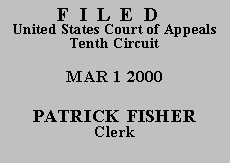

| UNITED STATES OF AMERICA,
Plaintiff-Appellee, Defendant-Appellant. |
No. 99-2307
(D.C. No. CIV-99-1021-JC) |
Petitioner Ramon Villalobos Reyes, appearing pro se, seeks a certificate of appealability following the district court's denial of his petition for a writ of habeas corpus under 28 U.S.C. § 2255, and subsequent denial of a certificate of appealability under 28 U.S.C. § 2253(c). To obtain a certificate of appealability, Mr. Villalobos Reyes must make "a substantial showing of the denial of a constitutional right." 28 U.S.C. § 2253(c)(2). We conclude that he has failed to make this showing, and accordingly we deny his request for a certificate of appealability and dismiss the appeal.
Mr. Villalobos Reyes pled guilty to a single-count indictment for possession of over 135 kilograms of marijuana in violation of 21 U.S.C. §§ 846 and 841. He now claims that he received ineffective assistance of counsel because his attorney failed to move for downward departure under the United States Sentencing Guidelines (USSG), which he argues would have enabled the court to impose a lesser sentence than the statutorily defined minimum sentence he received.
The statutory minimum for Mr. Villalobos Reyes' offense was 60 months. Under the Guidelines, his prison term would have been 41-51 months. Because the statutory minimum term was greater than the maximum term under the Guidelines, the Court imposed the statutory minimum as required by USSG § 5G1.1(b). Mr. Villalobos Reyes had three criminal history points under USSG
§ 4A1.1, making him ineligible for the "safety valve" exception to statutory minimum sentences. See USSG 5C1.2(1) (court must impose statutory minimum sentence if defendant has more than one criminal history point). He argues that he served little time in jail for these three offenses, and that the three criminal history points overstate the seriousness of his past criminal conduct.(1) On this basis, he argues his attorney was ineffective for failing to move for a downward sentencing departure pursuant to USSG § 4A1.3. See USSG § 4A1.3 (allowing courts to depart from the otherwise applicable Guideline range when points in criminal history category do not reflect the seriousness of defendant's past criminal conduct). Had his attorney done so, Mr. Villalobos Reyes contends the court could have removed some of his criminal history points, making him eligible for the "safety valve" exception of § 5C1.2 and a reduction in his sentence to the shorter term recommended by the Guidelines.
Mr. Villalobos Reyes is incorrect. The commentary to the safety valve provision clearly states that it refers to criminal history points "as determined
under § 4A1.1." USSG § 5C1.2, comment. (n.1). Thus, even if Mr. Villalobos Reyes' attorney had requested and obtained a downward departure under § 4A1.3, this would not have altered the original assessment of Mr. Villalobos Reyes' criminal history points as determined under § 4A1.1. A downward sentencing departure pursuant to § 4A1.3 does not affect the number of points in the defendant's criminal history category as determined by § 4A1.1.
This court has previously held that a reduction of a defendant's criminal history category under § 4A1.3 is irrelevant to his eligibility for the safety valve provision. See United States v. Owensby, 188 F.3d 1244, 1246-47 (10th Cir. 1999) ("[W]hile U.S.S.G. § 4A1.3 affords a sentencing court discretion to determine whether a criminal history category accurately reflects a defendant's criminal history, nothing in U.S.S.G. § 4A1.1 suggests that the sentencing court has any discretion with respect to the calculation of a defendant's criminal history score.") (citing United States v. Robinson, 158 F.3d 1291, 1294 (D.C. Cir. 1998), cert. denied, 119 S. Ct. 1155 (1999).(2)
Mr. Villalobos Reyes' sentence would thus not have been affected by an additional downward departure under the Guidelines, and a motion for such relief would have been futile. The failure of Mr. Villalobos Reyes' attorney to move for such a downward departure was neither objectively unreasonable nor prejudicial to Mr. Villalobos Reyes' case, and therefore does not constitute ineffective assistance of counsel under Strickland v. Washington, 466 U.S. 668 (1984).
For these reasons, we DENY Mr. Villalobos Reyes a certificate of appealability and DISMISS the appeal.
ENTERED FOR THE COURT
Stephanie K. Seymour
Chief Judge
*.This order and judgment is not binding precedent, except under the doctrines of law of the case, res judicata, or collateral estoppel. The court generally disfavors the citation of orders and judgments; nevertheless, an order and judgment may be cited under the terms and conditions of 10th Cir. R. 36.3.
1.The fact that Mr. Villalobos Reyes served little time in jail for these offenses is irrelevant to the amount of criminal history points he should be assessed for them. "[C]riminal history points are based on the sentence pronounced, not the length of time actually served" for the purposes of applying
§ 4A1.1(c). USSG § 4A1.2, comment. (n.2); see also United States v. Pettit, 938 F.2d 175, 178 (10th Cir. 1991). Mr. Villalobos Reyes has not provided us with a copy of his Pre-Sentence Report. Consequently, we do not know what these offenses were or the length of his sentences as opposed to how much time he actually served. However, this information is unnecessary for our disposition of the case.
2.Several other circuits addressing the issue have arrived at the same conclusion. See United States v. Orozco, 121 F.3d 628, 630 (11th Cir. 1997); United States v. Showalter, No. 96-4107, 1997 WL 1886 (4th Cir. Jan. 3, 1997) (unpublished); United States v. Ward, No. 95-5967, 1996 WL 531017 (4th Cir. Sept. 19, 1996) (unpublished); United States v. Moog, Nos. 95-3389, 95-3417, 95-4184, 1996 WL 431343 (8th Cir. Aug. 2, 1996) (unpublished); United States v. Resto, 74 F.3d 22, 28 (2d Cir. 1996); United States v. Valencia-Andrade, 72 F.3d 770, 774 (9th Cir. 1995).